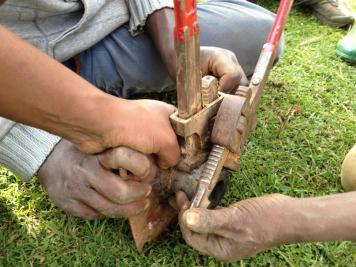Published on: 25/07/2016
This seminar aims to share some of the latest experiences in monitoring for sustainability, and to identify next steps for the wider use of relevant tools within the Consolidated WaSH Account (CWA) and the wider One WaSH National Programme. It is being organised by IRC with the One WaSH National Program, UNICEF, COWASH Project and Aguaconsult.
Date: Tuesday 9 August 2016, 09.00-16:00
Venue: Getfam Hotel, Addis Ababa, Ethiopa
Programme: see flyer
Contact: participation by invitation only, to attend please contact Ms. Fretsega Girma, girma@ircwash.org

The sustainability of improved access to water, sanitation and hygiene services is a critical concern for sector stakeholders whether consumers, service providers, service authorities, politicians or donors. In its second Growth and Transformation Plan the government has identified specific measures to improve functionality and ensure high service levels are maintained. This includes more post-construction support units and enhanced capacity. Monitoring also has a crucial role to play. Spotting and reporting gaps in service delivery (operational monitoring) or capacity and other aspects of the enabling environment is currently a major area of innovation. At the same time, the OWNP is developing its monitoring and evaluation (M&E) systems, and other key initiatives include new operation and maintenance (O&M) guidelines for rural water supply.
In small towns, UNICEF / DFIDs One WASH Plus Programme has trialled the use of Sustainability Checks to improve performance. Sustainability Checks capture occasional but regular information about the functionality of infrastructure and quality of WaSH services received by users as well as the capacity and performance of the institutions providing services and related support. In rural areas, Aguaconsult has applied the Sustainability Index Tool working with Save the Children and USAID. Similar tools have also been developed with a focus on sanitation. Such assessments aim to trigger medium to long-term actions and capacity building at a range of levels to improve sustainability.
At the seminar, case studies on the various initiatives will be presented and critical questions on their scalability and wider uptake will be addressed.